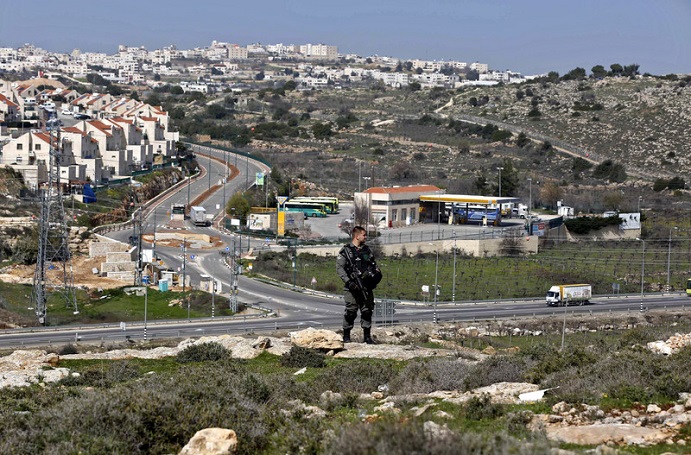
The Electronic Intifada / January 24, 2020
The position of the United Nations seems to be: Israeli war crimes are bad, but we’re not going to do anything to stop them and we’re going to undermine meaningful efforts toward accountability.
One example of this is the unprecedented delay of the publication of a UN database of businesses involved in Israeli settlements, whose construction is a war crime under international law.
Human rights groups submitted yet another urgent appeal to UN bodies this week urging action that would ensure publication of the database.
“The release of the UN database is a necessary step in ensuring compliance, control and accountability for the role of businesses in the expansion of Israel’s settlement enterprise,” the signatories to the appeal state.
In 2016, the UN Human Rights Council voted in favor of producing the database, with a release date of March 2017. But the Office of the High Commissioner for Human Rights, which is mandated to compile the list, has repeatedly delayed its publication.
“Several organizations, including Amnesty International and Human Rights Watch, have previously expressed concern that no other mandate given to the [Office of the High Commissioner for Human Rights] by the Human Rights Council has been subject to such a prolonged unfounded and unacceptable delay,” the appeal states.
Israel has pledged “to do everything it can to ensure that this list does not see the light of day,” as Danny Danon, the country’s ambassador to the UN, said in 2017.
Israel fears publication of the list would harm its economy by prompting companies to pull out of settlements, deterring others from doing business and encouraging investors to dump shares.
It could also boost grassroots boycott campaigns by helping publicize the names of corporations complicit in Israeli crimes.
In other words, it would impose a real cost on Israel for flouting international law, a cost that has so far been borne by Palestinians.
Yet the UN is burying the database even as the International Criminal Court is poised to launch a war crimes investigation over Israeli settlement construction in the occupied West Bank.
Settlement spending soars
Meanwhile, Israeli spending on West Bank settlement infrastructure has soared following the election of Donald Trump as US president in late 2016.
Israel has advanced or approved the construction of 22,000 housing units in the West Bank during that period.
The Trump administration has greenlit settlement construction and broken away from previous US policy and international consensus by recognizing Israel’s claims to sovereignty over the Golan Heights – Syrian territory it has occupied since 1967.
Netanyahu vowed this week to unilaterally annex all Israeli settlements in the West Bank if he wins upcoming elections.
His rival, Benny Gantz, pledged to annex the Jordan Valley of the West Bank in coordination with the international community if he is victorious at the polls.
Nickolay Mladenov, the UN’s Middle East peace process envoy, stated on Wednesday that annexation of West Bank land “would deal a devastating blow to the potential of reviving Israeli-Palestinian negotiations, advancing regional peace, the essence of the two-state solution.”
A 2016 UN Security Council resolution condemning Israeli settlements requires Mladenov to give quarterly updates on the implementation of the resolution’s provisions.
Those updates, as observed by Palestinian human rights groups, have “starkly noted the absence of action taken by the international community.”
But also starkly absent is any specific recommendation towards accountability in Mladenov’s updates, including calls for publication of the UN database. His approach has been to view Palestinian rights not as something be protected, but as subject to negotiation with Israel.
Handshakes with war criminals
One might accuse the UN envoy of sitting on his hands, but that wouldn’t be fair, as they have been busy clasping those of Israeli defense minister Naftali Bennett.
Bennett has recently promoted plans to build new settlements in the so-called H2 area of Hebron, the occupied West Bank city whose heart has been purged of its Palestinian population for the benefit of Israeli colonizers.
Bennett, who is seeking re-election to Israel’s parliament, recently announced the opening of “nature reserves” on West Bank land confiscated from Palestinians.
Declaring Palestinian property as nature reserves is an old Israeli ruse before eventually using the land for Jewish-only settlements.
Mladenov has also been busy shaking hands with Kamil Abu Rukun, the head of COGAT, the bureaucratic arm of Israel’s military occupation that openly declares collective punishment measures on Gaza’s two million Palestinians.
Dozens of Palestinians have died because they have been barred by COGAT from leaving Gaza for lifesaving medical care.
Last week Abu Rukun also enjoyed the warm embrace of Mladenov’s colleague Ursula Mueller, the UN assistant secretary-general for humanitarian affairs and emergency relief.
Unheeded warnings from the UN that Israel’s siege would make Gaza “unlivable” have been realized.
Yet Mueller praised Israel as “an important contributor” to global disaster management during a Tel Aviv conference, despite it engineering a humanitarian disaster in Gaza.
Mueller also “expressed appreciation” to the Israeli foreign ministry “for close collaboration and enhanced relations with OCHA,” the UN humanitarian affairs coordination body that she oversees – and which is charged with mitigating the devastating harm deliberately caused by Israel’s siege.
If this is the treatment that Israel receives from UN officials – despite bombing the world body’s facilities in Gaza and killing its students and staff – why would it change its behaviour?
As one observer recently remarked, Israel’s behaviour gets worse only because it can.
Maureen Clare Murphy is an associate editor of The Electronic Intifada and lives in Chicago












